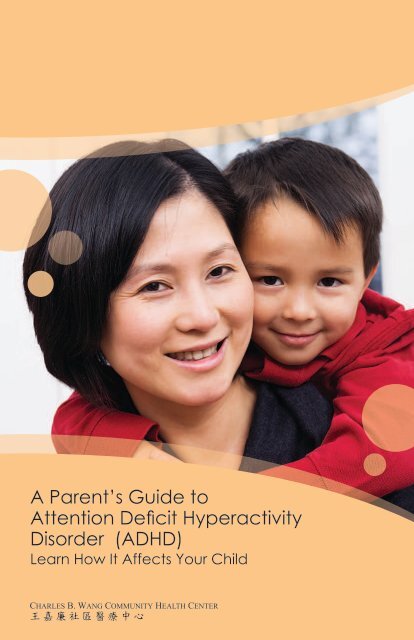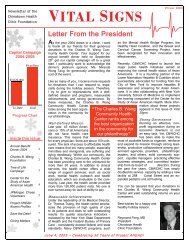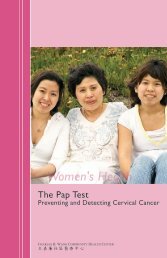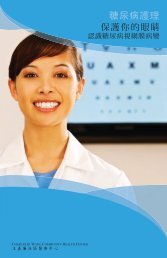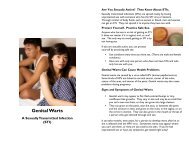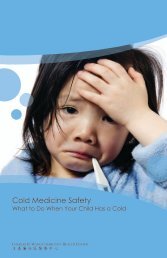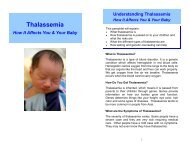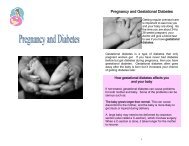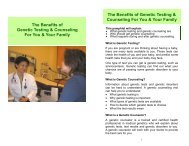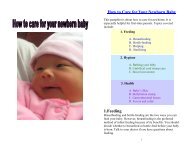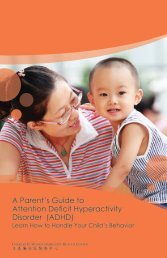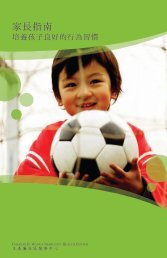ADHD - Charles B. Wang Community Health Center
ADHD - Charles B. Wang Community Health Center
ADHD - Charles B. Wang Community Health Center
You also want an ePaper? Increase the reach of your titles
YUMPU automatically turns print PDFs into web optimized ePapers that Google loves.
A Parent’s Guide to<br />
Attention Deficit Hyperactivity<br />
Disorder (<strong>ADHD</strong>)<br />
Learn How It Affects Your Child
<strong>ADHD</strong> Can Affect Your Child’s Behavior<br />
It’s normal for children to fidget or not pay attention once in a while.<br />
However, if your child cannot sit still or focus on tasks on a daily<br />
basis, your child may have <strong>ADHD</strong> (Attention Deficit Hyperactivity<br />
Disorder). <strong>ADHD</strong> affects about one in 20 children, or an average of<br />
at least one child in every classroom.<br />
<strong>ADHD</strong> makes it hard for children to focus on a task for a long time<br />
or control their actions. It may be caused by decreased amounts<br />
of chemicals in the brain. It also tends to run in families. It is not<br />
caused by parents, teachers, sugar, or specific foods. Children<br />
usually do not outgrow <strong>ADHD</strong>, and it can affect their school work<br />
and home life if left untreated.<br />
Children with<br />
<strong>ADHD</strong> may<br />
display some or<br />
all of the<br />
following<br />
behaviors:<br />
Inattention<br />
Having trouble following directions<br />
Not finishing tasks<br />
Getting distracted easily<br />
____________________________<br />
Hyperactivity<br />
Having trouble sitting still<br />
Doing several things at once<br />
Talking or moving around nonstop<br />
____________________________<br />
Impulsivity<br />
Acting without thinking<br />
Being impatient<br />
Having trouble taking turns<br />
<strong>ADHD</strong> Does Not Just Affect Boys<br />
While <strong>ADHD</strong> is most common in boys, it can also affect:<br />
Girls-They are more likely to be inattentive, daydream, or have<br />
trouble following instructions or staying organized. Their symptoms<br />
often go unnoticed.<br />
Teenagers-Dealing with <strong>ADHD</strong> becomes a challenge in high<br />
school since students must organize assignments and complete<br />
complex projects.<br />
Adults-Many children continue to have <strong>ADHD</strong> as adults. They<br />
may feel restless and have trouble staying focused. This can cause<br />
problems with work, personal relationships, and parenting.<br />
2
Find Out If Your Child Has <strong>ADHD</strong><br />
Some parents refuse to have their child screened for <strong>ADHD</strong> because<br />
they do not want their child to be labeled with a disorder. However,<br />
it is important that children get screened and receive the help they<br />
need to do well in school and lead a successful life. If you think<br />
your child may have <strong>ADHD</strong>, have your child tested by specialists to<br />
get a proper diagnosis.<br />
To find out if your child has <strong>ADHD</strong>, your child’s doctor, a child<br />
psychiatrist, a child development specialist, and a social worker will<br />
work together to:<br />
Do a physical exam-Your pediatrician will make sure that your<br />
child is healthy and rule out any physical problems.<br />
Take your family history-Since <strong>ADHD</strong> tends to run in families,<br />
a family medical history can help the specialists learn about your<br />
child’s condition.<br />
Review school records-A review of school records can screen<br />
for any learning problems since <strong>ADHD</strong> is often linked to learning<br />
problems.<br />
Assess your child’s behavior-Work with your child’s teacher to<br />
fill out some surveys and forms for the specialists. The surveys and<br />
forms let the specialists know how well your child is doing at home<br />
and at school compared to other children.<br />
To be diagnosed with <strong>ADHD</strong>, a child must show <strong>ADHD</strong><br />
symptoms that:<br />
Occur in more than 1 setting, such as home,<br />
school, or social settings<br />
Start before the age of 7<br />
(although they may not be<br />
recognized until later)<br />
Continue for more<br />
than 6 months<br />
3
Get Treatment For Your Child<br />
Children with <strong>ADHD</strong> may have problems with school work, low<br />
self-esteem, anxiety, or depression. They are also more likely to<br />
drop out of school. If your child has been diagnosed with <strong>ADHD</strong>,<br />
seek treatment early. Without treatment, your child’s entire life can<br />
be affected by <strong>ADHD</strong>.<br />
Experts believe that the best way to manage <strong>ADHD</strong> is to combine<br />
different kinds of treatments. These may include:<br />
Behavior Therapy-Parents and teachers can learn ways to use<br />
positive reinforcement (e.g., praises and reward systems) to change<br />
the child’s behavior. This helps encourage good behavior and<br />
reduce bad behavior.<br />
Medicine-It can help your child focus better and act less impulsively.<br />
There are different kinds of <strong>ADHD</strong> medicine, so sometimes the<br />
doctor has to try a few types to find the one that works best for<br />
your child.<br />
Counseling-A mental health provider can help your child deal<br />
with his or her <strong>ADHD</strong> symptoms. This also helps your child cope<br />
with low self-esteem, anxiety, depression, and stubborn behaviors,<br />
which may be linked to <strong>ADHD</strong>.<br />
Work with your child’s doctor and teacher to help your child<br />
manage his or her <strong>ADHD</strong>. When children learn to cope with <strong>ADHD</strong><br />
early on, they can lead normal and successful lives.<br />
To Learn<br />
More About<br />
<strong>ADHD</strong>, Call<br />
Or Visit:<br />
Attention Deficit Disorder Association<br />
(ADDA)<br />
1-847-432-ADDA (1-847-432-2332)<br />
www.add.org<br />
Children and Adults with Attention<br />
Deficit Hyperactivity Disorder(CHADD)<br />
1-800-233-4050 www.chadd.org<br />
ADDvance Online Resource for<br />
Women and Girls with <strong>ADHD</strong><br />
www.addvance.com<br />
<strong>Health</strong>y Children<br />
www.healthychildren.org<br />
4
General Info Line / 諮 詢 熱 線<br />
(212) 226-8339<br />
Website / 網 址<br />
www.cbwchc.org<br />
268 Canal Street, New York, NY 10013<br />
Internal Medicine / 內 科 部<br />
(212) 379-6998<br />
Women’s <strong>Health</strong> / 婦 女 健 康 部<br />
(212) 966-0228<br />
125 Walker Street, 2/F, New York, NY 10013<br />
Pediatrics & Adolescent <strong>Health</strong> / 兒 科 及 青 少 年 部<br />
(212) 226-3888<br />
Dental / 牙 科 部<br />
(212) 226-9339<br />
136-26 37th Avenue, 2 & 4/F, Flushing, NY 11354<br />
Internal Medicine / 內 科 部<br />
OB/GYN / 婦 產 科 部<br />
(718) 886-1200<br />
Pediatrics / 兒 科 部<br />
(718) 886-1222<br />
<strong>Health</strong> Education Department / 健 康 教 育 部<br />
(212) 966-0461<br />
The <strong>Charles</strong> B. <strong>Wang</strong> <strong>Community</strong> <strong>Health</strong> <strong>Center</strong> encourages electronic or print redistribution<br />
of this material for non-profit purposes, provided that you acknowledge this material as the<br />
health center’s work product. Unauthorized, for profit redistribution is not allowed.<br />
The content of this brochure has been reviewed by clinical staff. The content is not a substitute<br />
for professional medical advice. See your doctor if you have questions about a medical condition.<br />
王 嘉 廉 社 區 醫 療 中 心 鼓 勵 以 非 牟 利 性 的 電 子 信 息 或 印 刷 品 形 式 使 用 本 資 料 , 同 時 請 注<br />
明 本 資 料 是 由 王 嘉 廉 社 區 醫 療 中 心 編 製 。 未 經 許 可 , 不 得 以 牟 利 為 目 的 使 用 本 資 料 。<br />
這 份 資 料 的 內 容 已 由 本 中 心 的 醫 療 人 員 審 閱 , 資 料 的 內 容 不 能 取 代 專 業 人 員 的 醫 療 建<br />
議 。 如 有 任 何 關 於 醫 療 的 問 題 , 請 與 醫 生 聯 系 。<br />
© 4/2010


